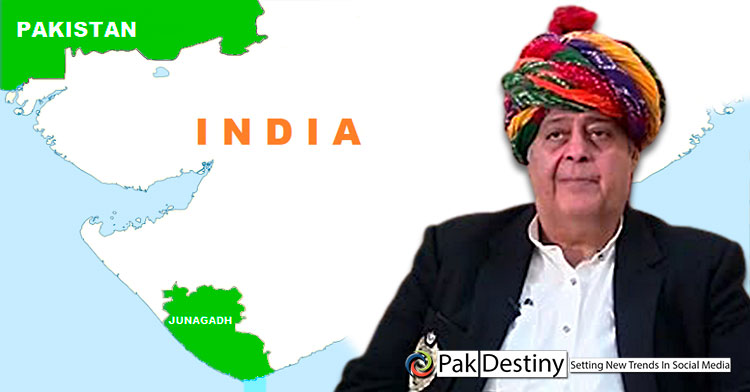
By Zaheer Ahmad
Junagarh, a lurking political crisis, a territorial dispute between two neighbours, a princely state under Indian occupation, as Pakistan has a rightful claim on the territory of 4,000 square miles and a 100-mile coastline along the Arabian Sea with many ports. Junagarh is a district in the Indian state of Gujarat; located on the Kathiawar Peninsula, Junagadh’s accession to Pakistan on September 15, 1947 was the first test of the Indian Independence Act of July 1947, which allowed the princely states to accede to either of the two dominions. The Muslims of Junagarh still observes 09 November 1974 as a black day of Indian occupation on their homeland. Ever since the Indian occupation royal family legal heir of the princely state has never let their lawful claim of Junagarh being part of Pakistan, as people of Junagarh acceded to Pakistan after partition, but Indian forcibly enter Army to occupied the land.
The mobilisation of Indian defence forces in the lead up to the accession of Junagadh in November 1947 and the management of violence directed at Junagadh’s Muslims afterwards are yet another instance of the forcible incorporation of Indian princely states and Indian Muslims into the reconstructed post-colonial state. Present in this matrix were also the ‘sub-states’ within Junagadh and the attendant questions of their autonomy, an instrumentalist alarmism about popular will and unrest and a hastily conducted referendum. These aspects of this contested accession have remained overshadowed in the historical record.
The notification of this accession in the newspapers outraged New Delhi, the accession of Junagadh to Pakistan, the government of India On September 17, 1947, disperse troops around Junagadh, As a result, the government of India resorted to two other tactics in order to bring Junagadh into line. The first was an economic blockade of the state, which choked the state of food and materials by the end of October 1947. The second tactic was the Arzi Hukumat (Provisional Government), which was set up under the leadership of Samaldas Gandhi, a nephew of Mahatma Gandhi, under the auspices of the government of India in Bombay.
Along with this, India also placed huge contingents of State and Dominion troops along the border with Junagadh, Thus, the issue had reached stalemate with neither side willing to compromise with a looming Indian attack on the virtually defenceless Junagadh.
The deteriorating security, food and economic situation of Junagadh made it easier for India to take over the state. The Nawab, together with his household left the state by the end of October to Karachi, leaving the state administration in the hands of the Dewan.
Thereafter, the government of India took over the administration of the state on November 9, 1947. The government of Pakistan reacted strongly to this action. Later on the plebiscite on February 20, 1948, under the control of Indian army and manipulated in favour of India, that Pakistan never accepted these results and to date considers Junagadh a legal part of Pakistan.
Recently Nawab of Junagarh Muhammad Jahangir Khanji appealed to Prime Minister Imran Khan to become an ambassador of Junagarh as he did in the case of Kashmir and highlight the issue of liberation of the state from Indian occupation at all international forums.
He recalled that in October 1947, during his visit to Pakistan his grandfather Nawab Mahabat Khan signed an agreement of accession to Pakistan. During the visit, his grandfather held a meeting with Quaid-i-Azam Mohammad Ali Jinnah and decided to accede the state to Pakistan. The treaty of accession was ratified by the Constituent Assembly of Pakistan. In the absence of his grandfather, India landed its troops and occupied the territory of Junagarh on November 9, 1947.
He said that Pakistan took the case of occupation of Junagarh to the United Nations Security Council. “The occupation was against the international law and norms,” he said, adding that a living nation should remember its history and act accordingly. The Nawab said that Junagarh was part of Pakistan and it would remain so.
“The occupation of Junagarh by India violated Article 26 of the Vienna Convention on Law of Treaties and the state should be merged with Pakistan”, he said.
On August 5, 2020, Pakistan had approved and released the new political map of Pakistan, which includes territories of Jammu and Kashmir and a part of Ladakh. The map also included Junagadh, Manavadar and Sir Creek in Indian Gujarat as part of Pakistan.
The geo strategic importance of Junagarh and access to Arabian sea, give it a unique importance for regional trade route. Pakistan’s claim has a legal standing in the eye of international law, and UN must act accordingly to ensure protection of Muslim citizens of the state and peaceful resolution of this long standing territorial disputes between two states, UNSC must take this issue on priority. Meanwhile Pakistan must continue diplomatic efforts to keep highlighting this on global level, remain hopeful with diplomatic efforts to resolve 73 years old dispute by UN intervention in favour of Pakistan.
About author : Zaheer Ahmed is a political activist and a research analyst based in Lahore. He can be contacted at [email protected]






